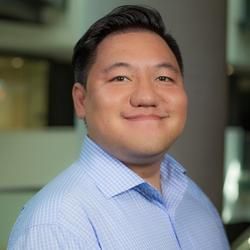Daniel Chen is always moving forward. His life has been a series of moves, both geographic and professional, that have brought new challenges and fresh perspectives wherever he finds himself. Born and raised in Taiwan in a family steeped in medicine, he grew up surrounded by conversations about health and care. At sixteen, he left with his younger brother and mother to start a new life in California, while my father stayed behind. Since then, he’s followed opportunities that landed him at the Milken Institute School of Public Health, where he leads research efforts at the Center for Community Resilience (CCR) to learn how community systems are experienced by residents and to design systems that promote equity and resilience.
What’s your story?

My story could be told as a map. I was born and raised in Taiwan, where health and medicine were simply part of our family DNA. Most of the adults in my family were medical professionals, so I grew up hearing the language of care and treatment at the dinner table.
When I was in high school, my father presented me with a choice: move to California now, or wait until after I finished college. After talking to my cousins, who had already moved, I decided that if I wanted to be part of American society in a meaningful way, it would be better to start sooner. So at sixteen, my younger brother, my mother, and I moved to California. My father stayed in Taiwan because, as a doctor, he couldn’t practice in the United States without retraining. People ask me if I experienced culture shock, but the truth is, I didn’t. I discovered instead that I enjoy new experiences and thrive on exploring different environments.
That tendency to keep moving eventually took me across the country to Philadelphia, then here, to Washington, DC, where I earned my doctorate and began my career. I’ve learned that I get bored easily if I’m not learning something new. That hunger for fresh challenges is a big reason why I’m still here at GW.
What gets you out of bed in the morning? What motivates you?
Every day starts with the knowledge that I don’t quite know what’s ahead, but it’s going to be fun, and that’s a good thing. Some days, things go smoothly. Other days, they don’t go my way at all. But I’ve learned that even the hard days teach me something that will help me tomorrow.
On a personal level, my family keeps me going. I have a son, and being part of his life gives me a strong sense of purpose. Professionally, I’m motivated by the people I work with and the communities we serve. Much of my work involves building partnerships to address complex health challenges. In one multi-year project funded by the CDC, we collaborated with more than ten communities across the country. Each community faced its own root causes for the issues it wanted to solve: ranging from childcare shortages to housing challenges to workforce gaps. This meant we had to adapt, dig deep into each community’s unique context, and learn from them. That kind of work keeps me engaged and inspired.
What is that one book that has influenced you the most?
When I was about eleven or twelve, I read Les Misérables in Chinese translation. It was the longest book I had ever read, and I ended up reading it cover to cover two or three times. I was completely drawn in by the story, but more than that, it changed how I thought about the world.
Growing up as the son of a doctor, I knew about illness and struggle, but Les Misérables gave me a deeper understanding of poverty, injustice, and survival. It made me think about the forces — political, economic, and social — that shape people’s lives and opportunities. Even now, decades later, I can see how that early exposure to those themes shaped my interest in systems and equity.
What absolutely excites you right now?
Right now, I’m fascinated by how emerging tools, like artificial intelligence and more accessible data, can help us understand complex systems — especially social systems that affect public health. The ability to combine qualitative insights with these new tools can help us model potential futures and see how different decisions might play out.
But I’m also deeply aware that as we integrate these technologies into decision-making, we can’t lose sight of the human voice. Communities must be heard, especially those whose perspectives have historically been left out. This is central to my work. For example, in one project in Washington, DC, we’re working with the GW Equity Institute and the GW Global Food Institute to examine food security east of the Anacostia River. It’s not enough to simply add more grocery stores. We need to understand transportation challenges, the economic impact of where people shop, and whether those purchases support local farmers and create local jobs. The community’s lived experience has to guide the solutions we design.
What is the most interesting thing we should know about you?
I was in a singing group in college that once opened for The Manhattan Transfer. My fifteen minutes of modest fame! I still enjoy singing; the last song I performed in the office was “A Whole New World” on the office karaoke machine. Yes, we have an office karaoke machine. I sang both parts: Aladdin and Jasmine.
But if you really want to know me outside of work, cooking is my creative outlet. I have two signature family dishes: three-cup chicken, a traditional Taiwanese recipe made with rice wine, soy sauce, and sesame oil; and slow-cooked pork belly, rich and savory. Both dishes take time and patience, which is part of the appeal. In a way, it’s not so different from my professional work. Both require listening, timing, and knowing when to let things develop at their own pace.



